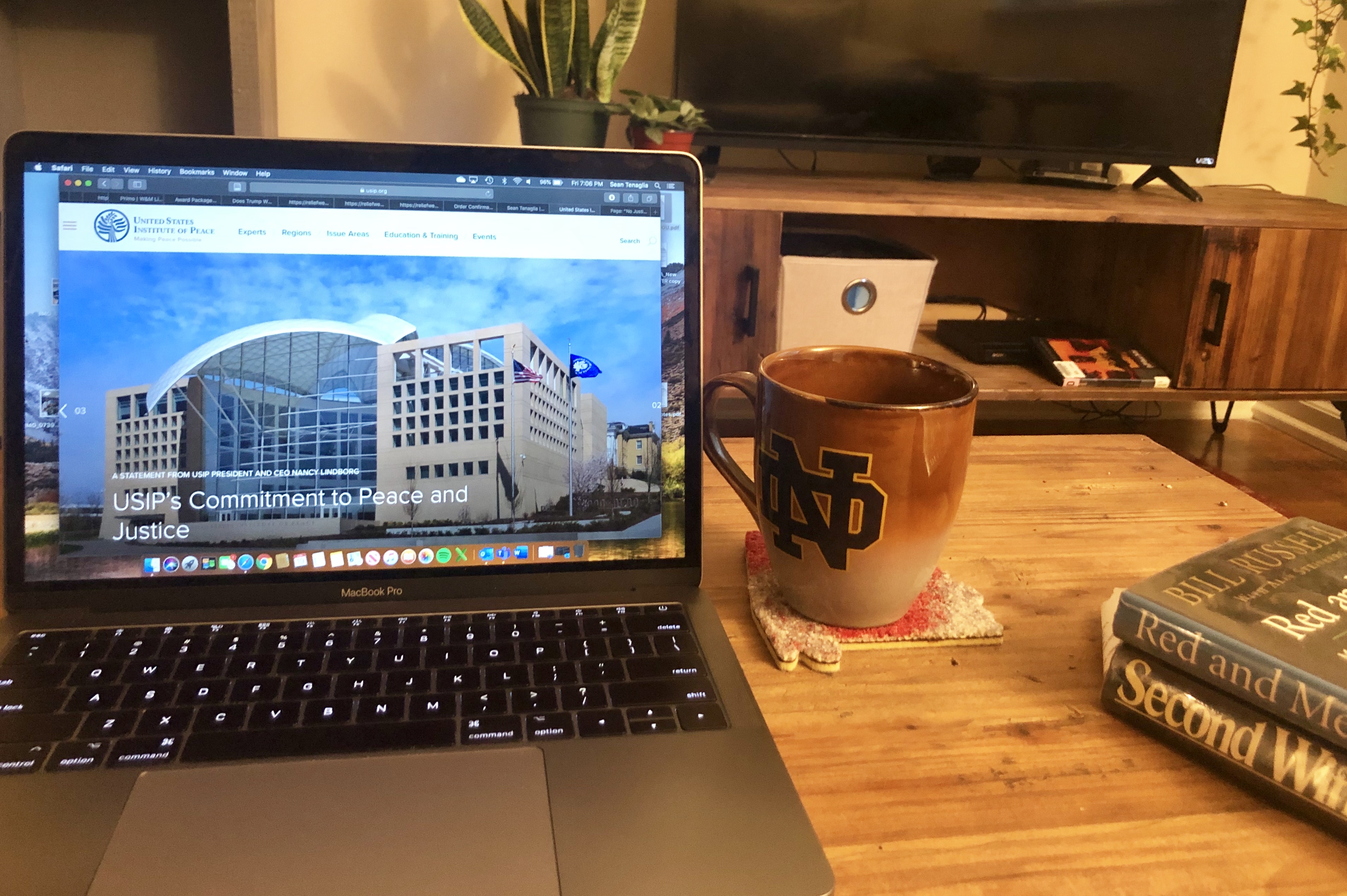“No Justice, No Peace,” at Home and Abroad

“How was your first day of work?”
This question might elicit a typical response such as, “It was good. Met my co-workers, had orientation, got settled into my desk.” As we’ve all come to realize these past few months, however, 2020 has produced new situations that are far from typical.
Thus, on a sunny Monday morning, I poured my cup of coffee, took a seat on the couch, and logged online to begin my remote summer internship as a Visiting Research Assistant with the United States Institute of Peace. Waiting for me in my inbox at 9:00am was a Zoom link to an all-organization meeting starting within the hour. I proceeded to spend my entire first morning on the job in an online discussion with nearly 300 people I had never met before, and likely wouldn’t be seeing in person any time soon. Atypical first day? Sure, it’s certainly not what I envisioned in February when I found out I’d have the incredible opportunity to work for a prestigious organization like USIP. But, as I immediately recognized, this unusual and even uncomfortable way to start a job was not only powerful, but also necessary for the institute, those who work there, and this brand new summer intern.
During the all-staff meeting, USIP’s leadership provided a forum for open and candid discussion about the state of the world and, in particular, our country in the wake of the horrific recent killings of George Floyd, Breonna Taylor, and Ahmaud Arbery, among others. Staff members used this space to raise challenging questions, share honest, insightful, and raw feelings, and present suggestions for next steps at both the personal and institutional levels. One of the most meaningful and reflective questions raised was, “How can we promote techniques and strategies to help facilitate peace across the globe when we have such deep-rooted problems here at home in the U.S.?” Of course, there is no simple solution to such a serious, complex issue.
As I listened to staff members share their thoughts and suggestions, as well as some of their own experiences with institutionalized racism, I continued to confront my own place within these destructive systems that benefit the few at the expense of the many. Simply getting to hear from my new colleagues, who’ve made fighting for peace and justice their life’s work, was instructive and powerful. Someone raised the important point that USIP’s mission includes engaging with and educating the public about strategies to promote peace, conflict resolution, inclusion, and empathy. As the institute continues to reflect on its role in the world during this time of critical reflection, its mission and core principles can serve as a meaningful starting point for anyone interested in seeking to promote true justice. While no easy answers leapt out during this Zoom call, I left feeling inspired and honored to get to work for an organization willing to honestly look inward while also pursuing peace in our nation and beyond.
It came as no surprise that my first assignment connected so deeply to these ongoing social discussions regarding injustice and police-community relations. I am beginning my summer as a Visiting Research Assistant with the Justice and Security Dialogue (JSD) team by gathering background information on the security situation in Northeast Nigeria. In particular, my research is focusing on the interactions between internally displaced persons (IDPs), the Nigerian police and military, and the various other security forces present in the region. Although not identical, many of the ongoing challenges in Nigeria have analogues here in the U.S. For example, Nigerian police-community relations have been fueled by years of mistrust, corruption, and police brutality. Protests have been dispersed violently and Nigerian security forces have often acted with impunity towards those they are entrusted to serve and protect. Sound familiar? IDPs, who have already been displaced from their homes due to ongoing Boko Haram insurgency attacks and communal clashes, cannot rely on the forces intended to protect their camps and host communities. As in the U.S., there is no one-size-fits-all solution that will solve these serious obstacles to peace and security in Nigeria and the many countries where USIP works. Nevertheless, the JSD team, which seeks to empower affected parties by bringing them into conversation with one another, provides one approach for beginning the process toward healing, conflict resolution, and justice.
Racism, injustice, discrimination, and conflict have long been institutionalized in our social systems, not just in the United States and Nigeria, but throughout the world. As I eagerly look forward to the remainder of my summer internship, I am grateful for the opportunity to place my research work within the context of our global, national, and personal reflections at this significant moment in history. While I'm sad that I won't get to walk through the doors of the institute's beautiful building overlooking the Lincoln Memorial each day, I am blessed to work for USIP, where I will aim to continue to listen and learn with empathy, solidarity, and understanding this summer with the goal of, as its mission states, “making peace possible.”